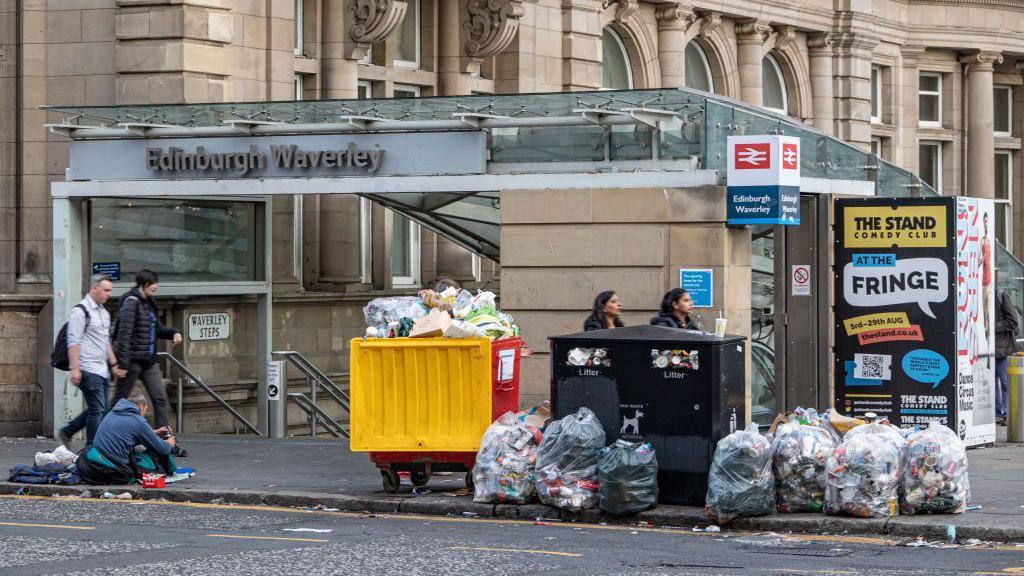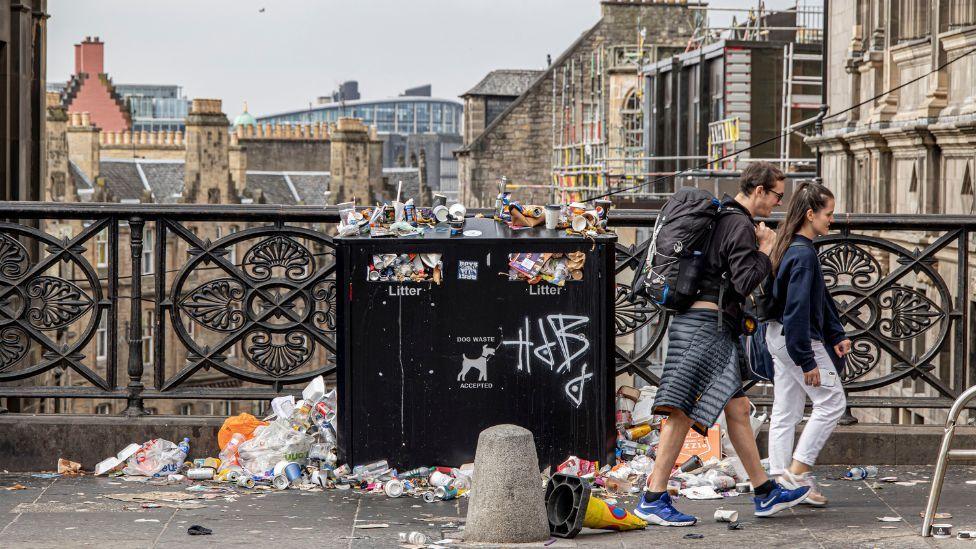Councils in push for government funds to avoid bin strikes

- Published
Councils are seeking a meeting with the Scottish government to ask for more money in an effort to avoid strikes by bin workers.
Unite, Unison and the GMB union have rejected a 3.2% pay deal and are due to announce strike dates next week.
Two previous council pay strikes – in 2022 and 2023 – were only resolved after the Scottish government gave councils more money to help.
Ministers have not yet agreed to meet with local government body Cosla - who say their current pay offer is "strong, fair and credible".
The Scottish government said any request for a meeting would be considered carefully.
It said pay negotiations were a matter for local authorities and urged all parties involved to work together to resolve the dispute.
The majority of Scotland's 32 councils are set to be affected by the action, which union officials warn will lead to rubbish piling up on the streets.
Strikes could begin in the middle of August - which for Edinburgh, means during the city's busy festival season.
The latest pay offer would have seen workers receive a blanket 3.2% rise for a one-year period between 1 April this year and 31 March 2025.
Cosla previously said it was higher than the rate of inflation and worth more than the first year of the Scottish government's pay policy elsewhere in the public sector.

Waste piled up across Edinburgh during the festival two years ago
Cosla's resources spokesperson, Councillor Katie Hagmann, said there was no more money available within council budgets for a higher offer without cuts to council jobs and services.
She urged trade unions to pause strikes until Cosla had discussed the matter with the Scottish government.
She said: "Cosla remains committed to continuing our negotiations towards finding a solution as quickly as possible, seeking to do all we can to avoid industrial action and its damaging impact on our communities.
“Council leaders value the local government workforce and their essential work across our communities and remain committed to reaching an agreeable solution as quickly as possible.”
But Unite said the most recent offer "grossly undervalues" Scottish council workers in contrast with the offer made to UK counterparts.
And Unison previously argued that negotiations had "not moved one iota" since it told Cosla it would move towards strike action.
GMB Scotland welcomed Cosla's decision to approach the Scottish government, but said it should have taken place weeks ago.
The union wrote to First Minister John Swinney on Tuesday calling on him to intervene in the dispute.
Louise Gilmour, GMB Scotland secretary, said: "Too much time has already been wasted discussing offers which merely repackage the same money.
“If the Scottish government does not come to the table, there will be no meaningful discussions, no route to a resolution and no chance of halting strike action.
“The first minister could and should break that gridlock.”
'Matter of urgency'
Ms Gilmour said any offer to Scots council workers must, as a minimum, match that offered by local authorities in England and Wales.
GMB Scotland already has a mandate for cleansing strikes in almost half of Scots councils and is re-balloting members in more.
Unison is also in the process of balloting 38,000 school, early years and family centre staff on strike action.
David O’Connor, Unison Scotland's lead for local government, said the "vast bulk" of council funding comes from the Scottish government, which committed to a council tax freeze.
He said: “It appears the threat of rubbish piling up in the streets and school closures is the only thing Cosla and the government will listen to.
"We need to hear a lot more from both of them before we can suspend industrial action.”
Graham McNab, Unite industrial officer added the union was open to a multi-year deal on the basis that it was a fair offer.
He said: "Something will need to shift but this situation is now in the hands of the politicians.
"They know what it will take and that’s an offer on the table which at least matches the one made to other UK council workers amounting to £1,290 or 5.2% for a council worker earning around £25,000."

It now seems that only the Scottish government can prevent council strikes. Council pay is negotiated between the unions and the council umbrella body Cosla.
But councils get much of their money from the Scottish government so extra government money could help them improve on the current 3.2% offer.
Until a new offer is on the table, it is unlikely that unions will withdraw the threat of strikes.
The council strikes in 2022 and 2023 were only called off after the government intervened and gave councils more money.
But the Scottish government would argue it has funding pressures of its own. Will it be able to help finance the kind of rise unions are hoping for?
At the very least, the unions will want to secure a bigger rise for the lowest paid.
A minimum rise of £1,290 per annum for the lowest paid is likely to be a line in the sand – this would match the offer made to council workers south of the border.

Related topics
- Published22 July 2024

- Published17 July 2024
